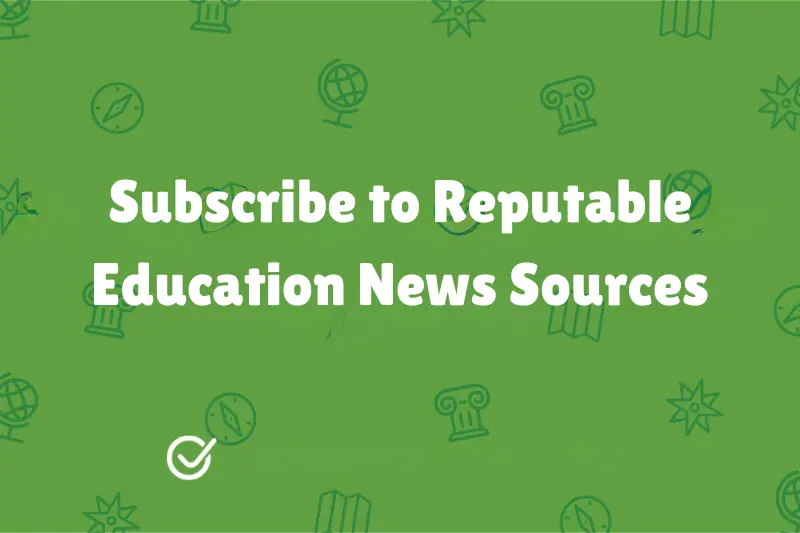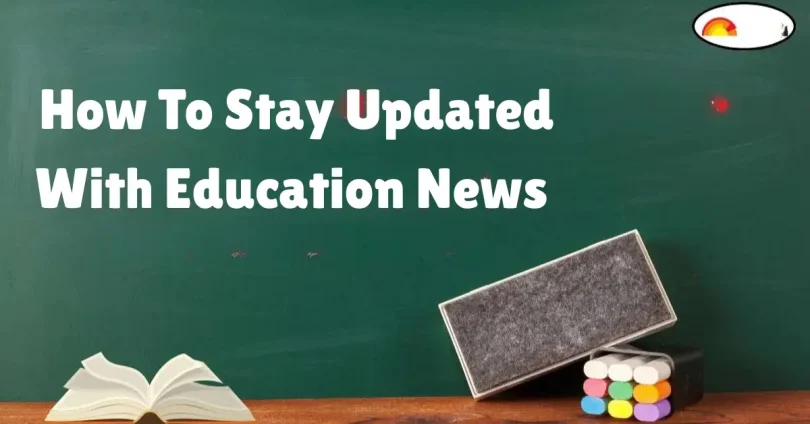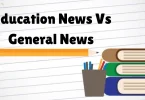In today’s fast-paced world, education is constantly changing. From new teaching methods and updated policies to technological advancements and groundbreaking research, staying informed is essential. But how can you stay updated with education news effectively, without feeling overwhelmed?
Take the example of Sara, a university lecturer who wants to introduce the latest digital learning tools in her classroom. If she doesn’t follow current education trends, she might miss out on innovative platforms or teaching strategies that could make her lessons more engaging and effective. By learning how to stay updated with education news, Sara can make informed decisions, adapt her teaching methods, and ensure her students benefit from the latest advancements.
In this guide, we’ll walk you through practical strategies and tips on how to stay updated with education news in a way that fits easily into your daily routine.
1. Subscribe to Reputable Education News Sources

The first step in learning how to stay updated with education news is to rely on credible and trustworthy sources. Not all online information is accurate or relevant, so focusing on established platforms is key. Here are some of the most reliable:
- Education Week – Offers comprehensive coverage of K-12 policies, teaching strategies, and school reforms. It’s a go-to source for educators seeking the latest in classroom innovation.
- Inside Higher Ed – Focuses on higher education trends, institutional developments, policy changes, and academic research. It’s particularly useful for university professionals and researchers.
- The Chronicle of Higher Education – Provides in-depth articles for educators, administrators, and researchers, including updates on funding, curriculum changes, and academic careers.
Pro Tip: Subscribe to email newsletters or daily updates from these sources. This ensures that important news comes directly to your inbox, saving you time and helping you stay informed without constantly searching for information.
2. Follow Education Blogs and Podcasts
Blogs and podcasts are excellent tools to stay updated with education news, especially if you have a busy schedule. They allow you to learn while commuting, exercising, or even doing household chores. Some valuable options include:
- Edutopia – Covers practical strategies, teaching innovations, and inspiring classroom stories.
- TeachThought Podcast – Explores trends in education, teaching strategies, and interviews with experts.
- Higher Ed Live – Features discussions with leaders in higher education and insights on policy, research, and innovation.
Pro Tip: Dedicate 15–30 minutes per week to reading or listening. Take notes on actionable ideas and consider implementing them in your own work or learning environment.
3. Leverage Social Media Wisely
Social media is more than just entertainment—it can be a powerful tool to stay updated with education news. The key is using it strategically:
- Twitter/X – Many educators, institutions, and thought leaders share real-time news, research updates, and educational insights. Follow hashtags like #EdTech, #HigherEd, and #K12Education.
- LinkedIn – Join education-focused groups and follow professionals to access long-form articles, discussions, and professional insights.
- YouTube – Educational channels often summarize recent research, conferences, and emerging trends in visual, easy-to-digest formats.
Pro Tip: Create a separate feed or list dedicated to education news. This keeps your learning focused and prevents your social media from becoming overwhelming.
4. Join Professional Networks and Associations
Professional organizations are excellent resources to stay updated with education news while networking with peers. Membership often includes access to newsletters, journals, webinars, and exclusive events. Some leading organizations include:
- American Educational Research Association (AERA) – Offers research publications, webinars, and networking opportunities for educators and researchers.
- National Education Association (NEA) – Provides policy updates, teaching resources, and advocacy news.
- International Society for Technology in Education (ISTE) – Focuses on educational technology trends, tools, and best practices.
Pro Tip: Actively participate in forums, discussion groups, and webinars to learn directly from experts and peers. This interaction helps you understand the practical implications of new trends.
You may also like to read this:
Why Study Tools Help In Learning: Tips For Academic Success
20 Top Study Tools For Students To Ace Exams & Assignments
Study Tools Vs Traditional Notes: Best Method For Students
What Is Education News? Guide To Trends & Updates
10 Key Types of Updates In Education Transforming Classrooms
5. Attend Webinars, Conferences, and Workshops
Live events offer unique opportunities to stay updated with education news. They allow you to:
- Learn directly from industry experts about the latest research, policies, and innovations.
- Connect with educators, administrators, and professionals to exchange ideas and experiences.
- Discuss emerging trends, challenges, and solutions in real-time.
Even attending a few online sessions or local workshops each month can significantly expand your knowledge and perspective.
Pro Tip: Make a list of conferences or webinars relevant to your field and schedule participation in advance to ensure consistency.
6. Set Up Google Alerts and Use RSS Feeds

Technology can help automate the process of learning how to stay updated with education news.
- Google Alerts – Enter keywords like “education news,” “educational technology,” or “higher education trends” to receive notifications when new content is published.
- RSS Feeds – Tools like Feedly allow you to follow multiple sources in one place, making it easier to scan headlines and select what to read in-depth.
Pro Tip: Limit alerts to 3–5 high-priority topics to avoid being overwhelmed with information.
7. Dedicate Time for Reading and Reflection
Staying informed is not just about consuming news—it’s about processing, reflecting, and applying knowledge. Set aside dedicated time each day or week to:
- Read articles, journals, and newsletters thoroughly.
- Summarize key points or create action notes.
- Discuss insights with colleagues or peers to gain different perspectives.
This ensures that your knowledge is actionable, not just superficial, and helps you apply new insights effectively.
8. Participate in Online Communities and Forums
Online communities are another effective way to stay updated with education news while engaging with like-minded professionals. Platforms such as Reddit’s r/education, Quora, and specialized education forums allow you to:
- Share and discuss news articles and research.
- Ask questions and receive insights from experienced educators.
- Stay informed about trends and challenges affecting the education sector in real-time.
Pro Tip: Actively contribute to discussions instead of just reading. Engaging with peers helps you better understand how educational news impacts practical teaching and administrative strategies.
9. Use Educational News Aggregators
If you want a single place to track multiple sources, consider news aggregators and apps. These tools compile updates from trusted websites, blogs, and journals so you can scan everything at once. Popular options include:
- Feedly – Customize feeds from multiple educational websites and blogs.
- Flipboard – Curate your own “education news” magazine from various sources.
- Pocket – Save articles to read later and organize them by topic.
Pro Tip: Dedicate a few minutes daily to skim headlines, then select articles that are most relevant to your interests or professional needs.
10. Follow Key Education Leaders and Influencers
Many education experts and thought leaders share timely updates, opinions, and research findings on social media and blogs. Following them can give you insights into emerging trends before they appear in mainstream media. Examples include:
- Sal Khan (Khan Academy) – Updates on innovative learning approaches and EdTech initiatives.
- Linda Darling-Hammond – Insights on educational policy and equity in learning.
- Tony Bates – Focuses on online learning and higher education developments.
Pro Tip: Make a list of 10–15 leaders whose content aligns with your professional goals. Set aside time weekly to review their posts and updates.
11. Incorporate Learning into Daily Routine
Consistency is key to staying informed. Integrate learning into your everyday life so it doesn’t feel like an added task. For example:
- Listen to an education podcast during your commute.
- Read one article from a newsletter while having coffee.
- Discuss an interesting development with a colleague during lunch breaks.
Pro Tip: Use tools like calendar reminders or habit-tracking apps to make your news-reading routine consistent. Small, daily habits compound over time to create a well-informed perspective.
12. Evaluate and Reflect on What You Learn
Not all education news will be relevant to your needs, so evaluation is crucial. Ask yourself:
- How does this news impact my classroom, institution, or professional growth?
- Is this a long-term trend or a temporary development?
- What actionable steps can I take based on this information?
Pro Tip: Maintain a digital or physical notebook to jot down insights, ideas, and strategies you plan to implement. Reviewing these notes periodically ensures your learning translates into real-world action.
Final Thoughts
Mastering how to stay updated with education news is about creating a sustainable, consistent approach. Combining reliable news sources, blogs and podcasts, social media, professional networks, live events, online communities, and thoughtful reflection helps you remain informed without feeling overwhelmed.
Remember, staying updated is not just about reading—it’s about engaging, analyzing, and applying the information to your work or studies. Start with a few strategies, build a habit, and gradually expand your toolkit. Over time, you’ll develop a strong, informed perspective that keeps you ahead in the dynamic world of education.
FAQs
1. Why is it important to stay updated with education news?
Staying updated helps educators, students, and professionals make informed decisions, adopt innovative strategies, and stay relevant in a constantly evolving field. It also allows you to understand policy changes, research breakthroughs, and emerging trends.
2. What are the best sources to follow for education news?
Reliable sources include Education Week for K-12 updates, Inside Higher Ed for higher education trends, and The Chronicle of Higher Education for in-depth insights on academic policies and research.
3. Can social media help me stay informed about education news?
Yes, platforms like Twitter/X, LinkedIn, and YouTube are valuable for real-time updates. Following educators, institutions, and thought leaders allows you to access trending news, discussions, and professional insights.
4. How can blogs and podcasts make it easier to stay updated?
Blogs and podcasts allow you to learn on the go, whether during a commute, workout, or break. Popular options include Edutopia, TeachThought Podcast, and Higher Ed Live, which provide practical strategies and discussions on trends.
5. Are professional networks and associations helpful for staying updated?
Absolutely. Organizations like AERA, NEA, and ISTE offer newsletters, webinars, research publications, and networking opportunities that keep members informed about policies, innovations, and best practices.




